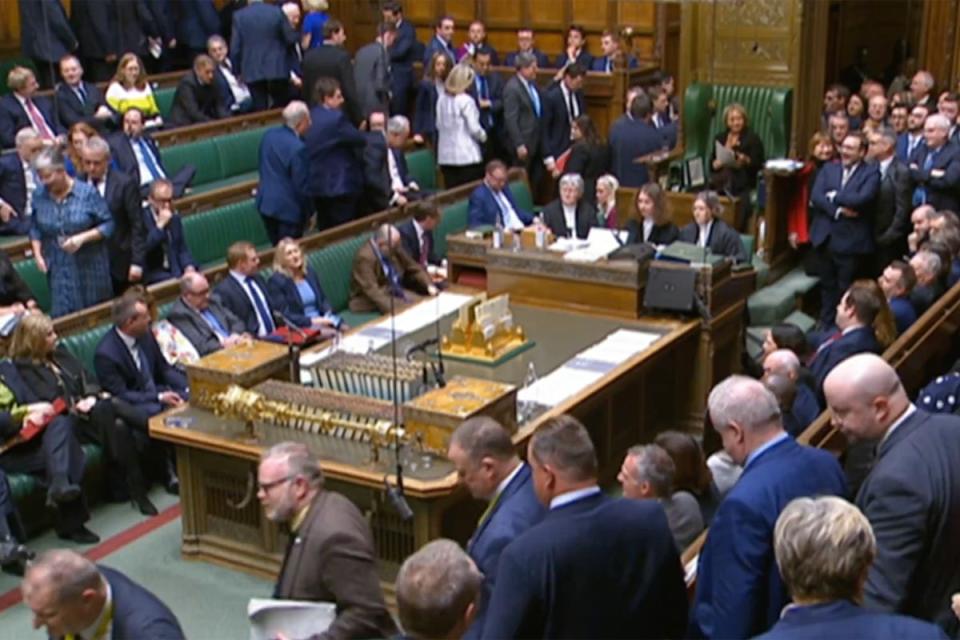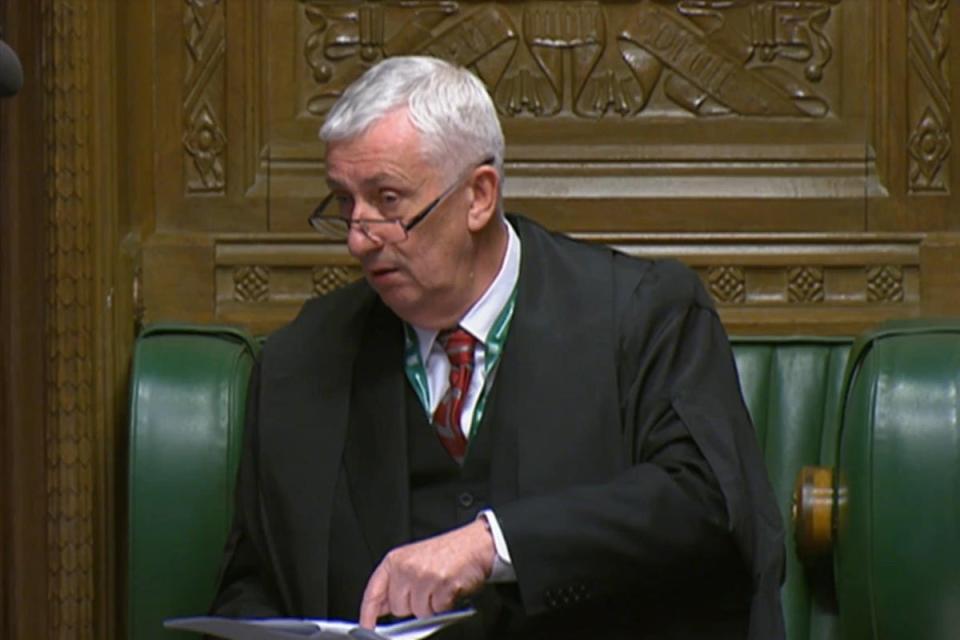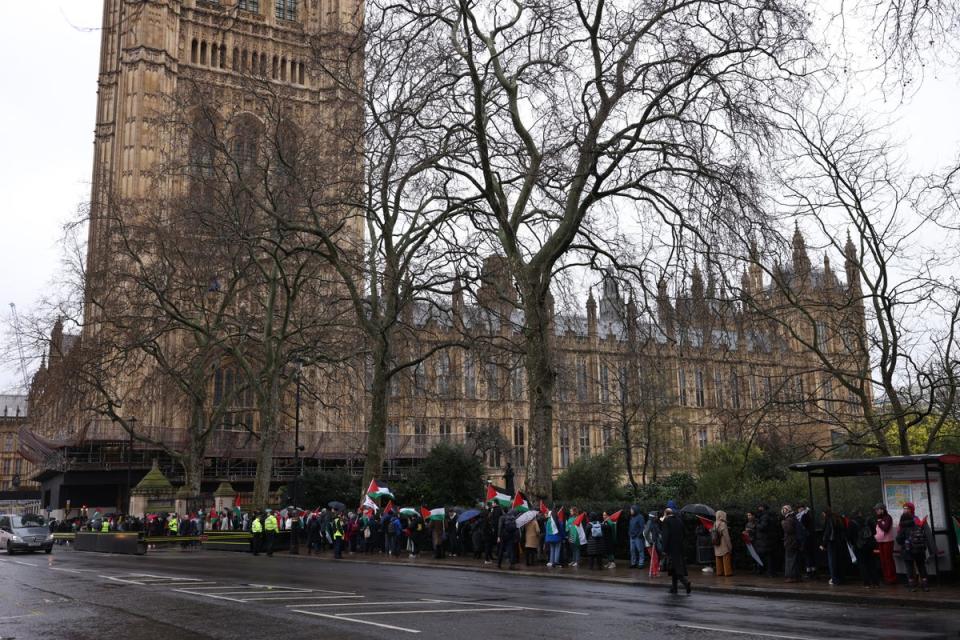Tories and SNP walk out of Commons in protest at speaker in Gaza ceasefire vote
Chaos broke out in the House of Commons on Wednesday night as furious MPs walked out in protest at the speaker’s handling of the Gaza ceasefire debate.
Dozens also signed a vote of no confidence against him.
Members on both sides left the chamber in anger after Sir Lindsay Hoyle allowed amendments from the government and Labour on the SNP’s motion calling for “an immediate ceasefire” in the Israel-Hamas war, which has cost more than 29,000 lives according to the Gaza health ministry.
This broke convention in which only the government’s amendment should have been debated and voted on.
In a night of extraordinary drama in Westminster, the speaker’s decision prompted howls of protest from MPs and shouts of “bring back Bercow” – referring to his controversial predecessor, John Bercow.
He was then forced to return to the Commons to issue a grovelling apology for the mayhem, which was thwarted by shouts of “resign” from MPs on both sides of the House.

The evening descended into chaos after Sir Lindsay ruled that the Commons should vote first on Labour’s call for an “immediate humanitarian ceasefire” before moving on to the SNP’s original motion, and then finally onto the government’s proposals if either of the first two failed to garner enough support.
Both Tory and SNP MPs walked out, leaving Labour’s amendment to pass unopposed.
Commons Leader and Tory MP Penny Mordaunt accused the speaker of hijacking the debate and undermining the confidence of the House by selecting Labour’s amendment.
She said he had “raised temperatures” and put MPs in a “more difficult position”.
Sir Lindsay had been warned by House of Commons clerk Tom Goldsmith about the unprecedented nature of his decision before his clash with MPs, the senior official saying he felt “compelled to point out that long-established conventions are not being followed in this case”.
The speaker now faces a no-confidence motion, which was gathering support from both Conservative and SNP members across the House.
Proposed by Tory MP William Wragg, it had been signed by 33 Tory and SNP MPs late on Wednesday evening.
Sir Lindsay tried to quell the fury of MPs by telling the Commons: “I thought I was doing the right thing and the best thing, and I regret it, and I apologise for how it’s ended up.
“I do take responsibility for my actions, and that’s why I want to meet with the key players who have been involved.”

But his efforts were jeered, and Mr Wragg claimed ministers had approached him saying they wanted to sign his no confidence motion.
Shadow Commons leader Lucy Powell said the government does not have the numbers for a majority on their motion, as she defended Sir Lindsay.
She told MPs: “Last time I looked, the government benches had a majority in this House, so if they don’t like the amendments that are before them, they could vote this evening to defeat those amendments.
“But they have decided now not to, I understand, vote in those debates. So perhaps we have to ask the question whether or not they do still command a majority in this House this evening, or whether they are trying to hide behind some other reason?”
Suggestions that the speaker had been influenced by threats from senior Labour figures to call their amendment were wrong, insisted deputy speaker Dame Rosie Winterton.
Conservative MP Philip Davies referred to a tweet claiming the speaker had been warned Labour would “bring him down” after the general election unless he called their Gaza amendment.
Amid shouts of “shocking” and jeers from Tory MPs, Mr Davis added: “Can you assure the house that everything will be done to identify who it was that put that intolerable pressure on the House of Commons speaker?”
Dame Rosie replied: “That tweet is wrong and the statement is incorrect.”
As the Commons descended into farce, Conservative former ministers were among those MPs suggesting the votes in the Gaza debate should be run again.
Trying to explain his actions by trying to allow all three amendments, Sir Lindsay said: “Today’s debate was exceptional in its intensity with which all parties wished to secure a vote.”
He said he had taken his decision with the right intentions to allow as many MPs as possible to express their view.

“I wanted to do the best, and it was my wish to do the best by every member of this House.”
He went on: “I was very concerned, I am still concerned... about the security of members, their families and the people that are involved.
“I am, and I regret with my sadness, that it’s ended up in this position. That was never my intention for it to end like this. I was absolutely convinced that the decision was done with the right intentions.”
Helen McEachern, chief executive of Care International UK, said she was dismayed by the “political theatrics” over parliamentary procedure that did nothing to help the people of Gaza.
“Without an immediate sustained ceasefire, they will not receive the food, water and medical supplies needed to save lives and prevent further injuries,” she said.
Sir Keir Starmer defended his party’s amendment, saying it was intended to unite parliament and “speak with one voice on the horrendous situation in Gaza and Israel”.
He insisted it was a “serious plan for such an incredibly serious situation” and accused the other parties of playing politics.
“Unfortunately, the Conservatives and the SNP decided to walk out hand in hand, refusing to vote on this serious matter, yet again choosing political games over serious solutions.”

 Yahoo News
Yahoo News 
